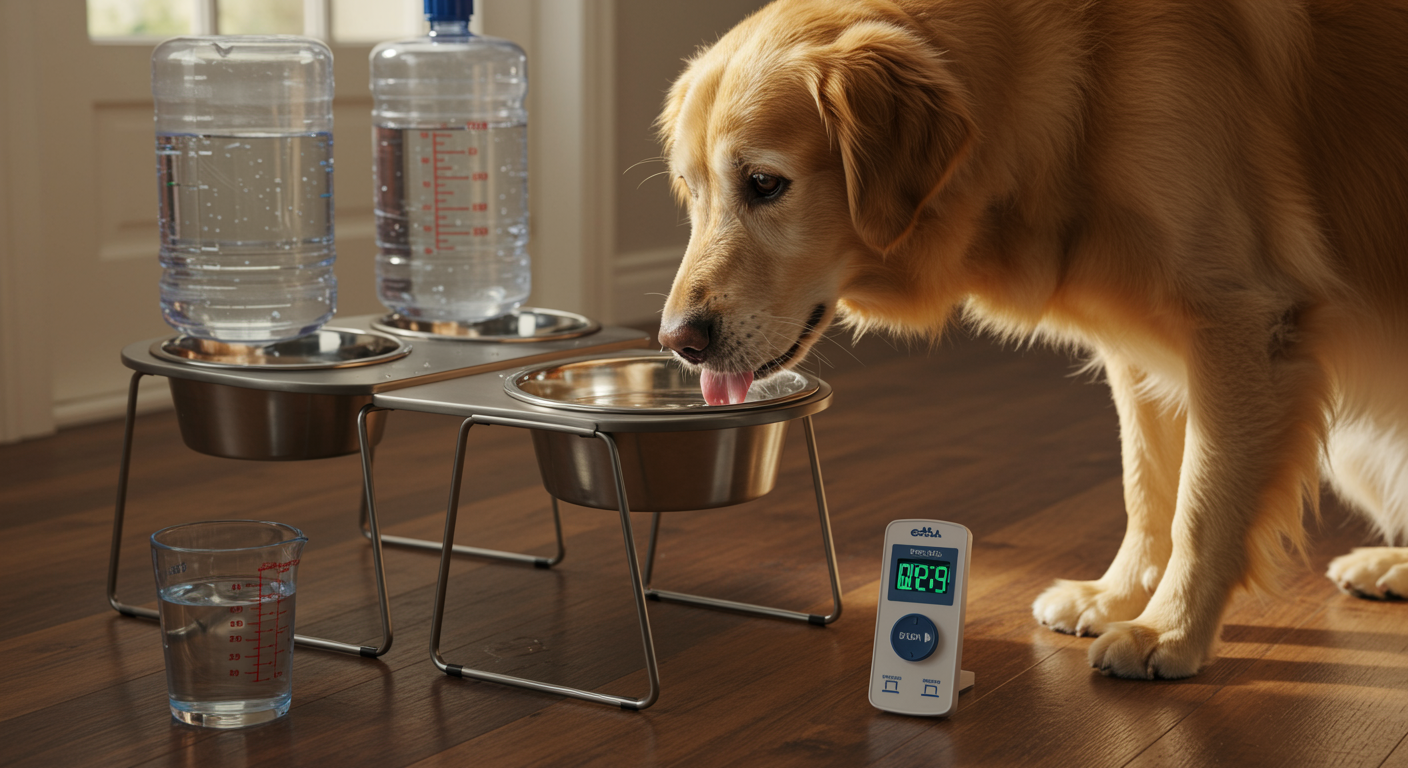Dehydration represents one of the most serious yet often overlooked health risks facing senior Golden Retrievers. As dogs age, their bodies become less efficient at regulating fluid balance, making them increasingly susceptible to dehydration-related complications that can rapidly become life-threatening if not promptly recognized and addressed.
Senior Golden Retrievers face unique challenges in maintaining proper hydration due to age-related changes in kidney function, decreased thirst sensation, reduced mobility that may limit access to water, and various medications that can affect fluid balance. Understanding these risk factors and implementing proactive prevention strategies becomes crucial for maintaining optimal health in aging dogs.
Early recognition of dehydration signs, combined with appropriate prevention and treatment protocols, can prevent minor fluid imbalances from progressing to serious medical emergencies that require intensive veterinary intervention and may have lasting health consequences.
Understanding Dehydration in Senior Dogs
Physiological Changes Affecting Hydration
Kidney Function Decline
Senior Golden Retrievers commonly experience gradual decline in kidney function, affecting their ability to concentrate urine and conserve body water effectively. This age-related change means that senior dogs lose more water through urination and require increased fluid intake to maintain proper hydration status.
The kidneys play a crucial role in regulating electrolyte balance and blood pressure, both of which are directly affected by hydration status. Compromised kidney function in senior dogs creates a cascading effect where dehydration can quickly lead to serious complications affecting multiple body systems.
Understanding the connection between kidney health and hydration helps explain why senior Golden Retrievers are at higher risk and why prompt intervention is so critical when dehydration signs appear.
Decreased Thirst Response
The natural thirst mechanism becomes less sensitive with age, meaning senior Golden Retrievers may not feel thirsty even when their bodies need additional fluids. This decreased thirst response can lead to chronic mild dehydration that gradually worsens over time.
Neurological changes affecting the hypothalamus, the brain region responsible for thirst regulation, contribute to this diminished response. Senior dogs may simply forget to drink or may not recognize their body’s signals for increased fluid intake.
This reduced thirst drive makes it essential for owners to monitor water intake actively and encourage drinking through various strategies rather than relying on the dog’s natural instincts to maintain adequate hydration.
Risk Factors Specific to Senior Golden Retrievers
Medication Effects on Fluid Balance
Many medications commonly prescribed to senior Golden Retrievers can affect hydration status. Diuretics used for heart conditions increase urine production, while some pain medications can affect kidney function and fluid regulation.
Medications for diabetes, arthritis, and other age-related conditions may have side effects that influence drinking behavior or fluid retention, requiring careful monitoring and potential adjustments in hydration management strategies.
Understanding medication effects allows for proactive hydration management and helps identify when additional monitoring or intervention may be necessary to maintain proper fluid balance.
Mobility Limitations and Water Access
Arthritis, joint stiffness, and other mobility issues common in senior Golden Retrievers can limit their ability to access water sources throughout the day. Dogs experiencing pain or difficulty moving may avoid making trips to water bowls, leading to gradual dehydration.
Changes in vision or cognitive function may also affect a dog’s ability to locate water sources or remember to drink regularly, particularly in unfamiliar environments or when normal routines are disrupted.
Ensuring easy access to multiple water sources and addressing mobility issues becomes crucial for preventing dehydration in senior dogs with physical limitations.
Recognizing Early Signs of Dehydration
Physical Assessment Techniques
Skin Tent Test and Elasticity
The skin tent test provides a quick, reliable method for assessing hydration status in senior Golden Retrievers. Gently pinch the skin between the shoulder blades and release; in well-hydrated dogs, the skin should immediately return to its normal position.
In dehydrated dogs, the skin remains “tented” for several seconds before slowly returning to normal position. The longer the skin takes to return, the more severe the dehydration. Senior dogs may show slower skin return even when normally hydrated due to age-related skin changes, making baseline knowledge important.
Regular practice of this assessment technique when the dog is healthy helps establish normal parameters and makes it easier to detect changes that indicate developing dehydration.
Gum and Mucous Membrane Evaluation
Healthy gums should be pink and moist to the touch. Dehydrated dogs often show dry, sticky gums that may appear pale or darker than normal. The capillary refill time, assessed by pressing on the gums and observing how quickly pink color returns, also increases with dehydration.
Normal capillary refill time should be less than two seconds. Prolonged refill time may indicate dehydration or other circulation problems that require immediate veterinary attention.
Changes in saliva consistency, with thick, ropy saliva indicating dehydration, provide additional assessment information that can help determine the severity of fluid imbalance.
Behavioral and Clinical Indicators
Changes in Activity and Alertness
Dehydrated senior Golden Retrievers often show decreased energy levels, reluctance to exercise, and reduced interest in normal activities. These changes may be subtle initially but become more pronounced as dehydration progresses.
Mental alertness may also decrease, with dogs appearing confused, disoriented, or less responsive to normal stimuli. These neurological signs indicate that dehydration is affecting brain function and requires immediate intervention.
Monitoring baseline activity levels and behavior patterns helps identify subtle changes that may indicate developing dehydration before more obvious physical signs appear.
Urination and Defecation Changes
Changes in urination patterns can both indicate and contribute to dehydration. Decreased urine production or very concentrated, dark-colored urine suggests dehydration, while excessive urination may indicate underlying conditions that increase dehydration risk.
Constipation often accompanies dehydration as the body attempts to conserve water by absorbing more fluid from the digestive tract. Hard, dry stools or difficulty defecating may indicate fluid imbalance.
Monitoring these elimination patterns provides valuable information about hydration status and can help identify both dehydration and underlying conditions that may contribute to fluid imbalance.
Comprehensive Dehydration Assessment Guide
| Assessment Method | Normal Findings | Mild Dehydration | Moderate Dehydration | Severe Dehydration | Action Required |
|---|---|---|---|---|---|
| Skin Tent Test | Immediate return | 2-3 second delay | 3-5 second delay | >5 second delay | Immediate vet care if >3 seconds |
| Gum Moisture | Pink and moist | Slightly tacky | Dry and sticky | Very dry, pale | Monitor closely, increase fluids |
| Capillary Refill | 4 seconds | Emergency care if >3 seconds | |||
| Energy Level | Normal activity | Slight decrease | Noticeable lethargy | Severe weakness | Vet consultation for marked changes |
| Urine Color | Light yellow | Darker yellow | Dark amber | Very dark/minimal | Immediate attention for dark urine |
| Water Intake | Normal drinking | Slight increase | Increased thirst | Excessive or absent | Monitor and encourage drinking |
Prevention Strategies for Senior Golden Retrievers
Environmental Modifications for Optimal Hydration
Strategic Water Bowl Placement
Multiple water sources throughout the home ensure that senior Golden Retrievers with mobility limitations always have easy access to fresh water. Place bowls on each level of the home and in areas where the dog spends significant time.
Elevated water bowls can make drinking more comfortable for dogs with arthritis or neck problems, encouraging more frequent water intake. Non-slip mats under bowls prevent sliding and provide stable footing for dogs with balance issues.
Fresh water should be available at all times, with bowls cleaned and refilled daily to maintain palatability and prevent bacterial growth that might discourage drinking.
Temperature and Quality Considerations
Many senior dogs prefer slightly warm or room-temperature water over very cold water, which may be more comfortable for sensitive teeth or stomachs. Experimenting with water temperature can help identify preferences that encourage increased intake.
Water quality affects palatability and safety. Filtered or bottled water may be preferred by some dogs, particularly if local tap water has strong chemical tastes or odors. Regular cleaning of water bowls prevents biofilm development that can affect taste.
Some senior Golden Retrievers benefit from flavoring water with small amounts of low-sodium broth or other dog-safe flavor enhancers to encourage increased consumption, particularly during illness or recovery periods.
Dietary Contributions to Hydration
Moisture-Rich Food Options
Wet or canned foods provide significantly more moisture than dry kibble, helping senior Golden Retrievers meet their hydration needs through diet. Adding water or broth to dry food increases moisture content while maintaining familiar food preferences.
Fresh fruits and vegetables safe for dogs, such as watermelon, cucumber, or carrots, can provide additional hydration while serving as healthy treats. These foods should be given in appropriate portions as part of the overall diet plan.
Frozen treats made from diluted broth or pureed fruits can provide hydration while offering mental stimulation and enjoyment, particularly beneficial during hot weather or recovery periods.
Feeding Schedule Optimization
Feeding schedules can be adjusted to support hydration, with meals offered during cooler parts of the day when dogs may be more inclined to eat and drink. Multiple smaller meals can help maintain consistent hydration throughout the day.
Soaking dry food before feeding not only increases moisture content but can also make food easier to chew and digest for senior dogs with dental issues, supporting both nutrition and hydration goals.
Monitoring food and water intake together helps identify patterns and potential problems early, allowing for prompt intervention before dehydration becomes serious.
Treatment Approaches for Dehydration
Home Management for Mild Dehydration
Encouraging Increased Water Intake
For mild dehydration detected early, encouraging increased voluntary water intake may be sufficient to restore proper hydration. Offering fresh water frequently, changing bowl locations, or adding appealing flavors can stimulate drinking.
Ice cubes or frozen treats can provide both hydration and mental stimulation while appealing to dogs who may not be interested in drinking plain water. Some dogs enjoy licking ice, which provides gradual fluid intake.
Monitoring response to increased water availability helps determine whether home management is sufficient or if veterinary intervention is necessary for safe and effective rehydration.
Environmental Support Measures
Creating a comfortable, stress-free environment supports recovery from mild dehydration. Ensuring the dog has access to cool, quiet areas and is not forced to compete for water resources helps encourage natural drinking behavior.
Reducing physical activity temporarily while focusing on rehydration prevents further fluid loss through panting and exertion. Gentle encouragement to drink without forcing helps maintain positive associations with water intake.
Careful monitoring during home treatment ensures that improvement occurs and helps identify when professional intervention becomes necessary for safe and effective treatment.
Professional Veterinary Treatment
Fluid Therapy Options
Moderate to severe dehydration requires professional veterinary treatment, typically involving subcutaneous or intravenous fluid administration. The route and rate of fluid replacement depend on the severity of dehydration and the dog’s overall health status.
Subcutaneous fluid administration provides gradual rehydration that is less stressful for many senior dogs while being effective for moderate dehydration. Intravenous therapy may be necessary for severe dehydration or when rapid rehydration is required.
Electrolyte balance must be carefully monitored and corrected during fluid therapy, as rapid changes in electrolyte levels can cause serious complications, particularly in senior dogs with compromised organ function.
Monitoring and Supportive Care
Professional treatment includes careful monitoring of vital signs, urine production, and overall response to fluid therapy. Senior dogs require particularly close observation due to their increased risk of complications from both dehydration and aggressive rehydration.
Additional supportive care may include treatment of underlying conditions contributing to dehydration, such as kidney disease, diabetes, or gastrointestinal problems. Addressing root causes helps prevent recurrence and supports long-term health.
Follow-up care instructions and monitoring protocols help ensure continued recovery and provide guidance for preventing future episodes of dehydration.
Special Considerations for Senior Golden Retrievers
Managing Underlying Health Conditions
Kidney Disease and Fluid Balance
Senior Golden Retrievers with kidney disease require specialized hydration management, as their compromised kidneys cannot effectively concentrate urine or maintain electrolyte balance. These dogs may need increased water intake while requiring careful monitoring to prevent fluid overload.
Prescription diets designed for kidney support often have modified protein and phosphorus levels while encouraging increased water intake through enhanced palatability or increased moisture content.
Regular monitoring of kidney function through blood tests helps guide hydration management strategies and identifies when treatment approaches need modification based on disease progression.
Diabetes and Hydration Challenges
Diabetic senior Golden Retrievers face unique hydration challenges due to increased urination associated with elevated blood glucose levels. These dogs require careful monitoring of both blood sugar and hydration status.
Insulin therapy and dietary management help control blood glucose levels, reducing excessive urination and associated fluid losses. However, hydration management remains crucial during the adjustment period and ongoing treatment.
Emergency protocols for diabetic dogs include recognition of dehydration as a potential complication of diabetic ketoacidosis or other diabetes-related emergencies requiring immediate veterinary attention.
Seasonal and Environmental Factors
Hot Weather Precautions
Summer heat poses increased dehydration risks for senior Golden Retrievers, who may be less able to regulate body temperature effectively. Providing shade, limiting outdoor activity during peak heat, and ensuring constant water access become critical.
Signs of heat-related dehydration may develop rapidly and can quickly progress to heat stroke, a life-threatening emergency. Early recognition and intervention are crucial for preventing serious complications.
Cooling strategies such as wet towels, cooling mats, or access to air conditioning help prevent heat-related dehydration while maintaining comfort for senior dogs during warm weather.
Winter Hydration Needs
Cold weather can also affect hydration, as dogs may drink less when water is very cold or when spending time outdoors in freezing conditions. Heated water bowls prevent freezing and encourage drinking during winter months.
Indoor heating can create dry air conditions that increase respiratory water losses, making adequate hydration even more important during winter months for dogs spending significant time indoors.
Monitoring hydration status remains important year-round, with seasonal adjustments in prevention strategies helping maintain optimal fluid balance regardless of environmental conditions.
Long-term Hydration Management
Developing Sustainable Habits
Daily Monitoring Routines
Establishing daily routines for monitoring hydration helps identify problems early and ensures consistent attention to this critical health aspect. Simple daily assessments can become part of regular care routines.
Water intake monitoring through measured daily water provision helps establish baseline consumption patterns and identify significant changes that may indicate health problems or developing dehydration.
Regular weight monitoring can help identify fluid losses or gains that may indicate hydration problems or underlying health issues affecting fluid balance.
Family Education and Involvement
All family members should understand the importance of hydration for senior dogs and know how to recognize early signs of dehydration. Consistent approaches to encouraging water intake help maintain optimal hydration status.
Emergency action plans should be established and understood by all caregivers, including when to seek veterinary care and basic first aid measures for suspected dehydration.
Communication with pet sitters, boarding facilities, or other caregivers ensures that hydration monitoring continues even when primary caregivers are not present.
Quality of Life Integration
Balancing Health Needs with Comfort
Hydration management should enhance rather than complicate the daily life of senior Golden Retrievers. Finding strategies that work within the dog’s preferences and capabilities supports long-term compliance and success.
Creative approaches to encouraging water intake, such as food puzzles that incorporate water or interactive water features, can make hydration management more engaging and enjoyable.
Focusing on overall comfort and quality of life while maintaining adequate hydration helps ensure that senior dogs continue to thrive and enjoy their golden years with optimal health support.
Proper hydration management represents a fundamental aspect of senior Golden Retriever care that significantly impacts overall health, comfort, and quality of life. Through understanding risk factors, implementing effective prevention strategies, and maintaining vigilant monitoring, owners can help ensure their beloved companions maintain optimal hydration status throughout their senior years.
Success in preventing and managing dehydration requires ongoing attention, family involvement, and professional veterinary support when needed. With proper care and attention, senior Golden Retrievers can maintain healthy hydration status that supports their continued health and happiness during their golden years.





Comments
Pingback: Hydration Tips for Senior Golden Retrievers: Encouraging Water Intake